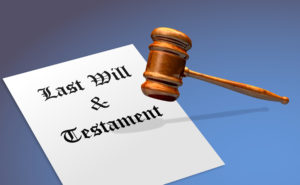What Happens If You Die Without a Will?

If you die without having made your last will and testament, you are said to have died intestate, meaning that the probate court in the county and state in which you live divides up your assets among your descendants.
Intestacy Laws
Each state has its own intestacy laws regarding which of your relatives receive what proportions of your probate estate. As you might expect, surviving spouses are almost always given preferential treatment, usually followed by surviving biological and adopted children.
For instance, assume that you die intestate leaving a surviving spouse and two surviving children. Many states would give half of your probate estate to your spouse and divide the other half equally between your two children. Other states would give your spouse a certain amount of your estate “off the top” before dividing the remaining half to him or her and the other half equally to your children.
Per Capita Versus Per Stirpes
Giving each of your surviving children an equal portion of your estate is called the per capita approach, i.e., each child gets an equal amount. But what if one of your adult children predeceases you, but his or her children survive you? In this situation, many states take what’s called the per stirpes approach. Here, the surviving children of your deceased child receive equal portions of the share of your estate that would have gone to their parent had he or she not predeceased you.
Your Probate Estate
Keep in mind that intestate distribution applies only to those assets that make up your probate estate. This does not include such things as the following:
- Joint bank, investment, and other accounts
- Any account on which you placed a “payable on death” designation
- Any vehicle or asset on which you placed a “transfer of death” designation
- Real property owned in joint tenancy with right of survivorship
- Life insurance policies with beneficiary designations
- Assets in a trust
These types of assets pass directly to the designated person(s) without having to go through probate.
Bottom Line
The real problem with dying intestate is that you have no control over how the state distributes your probate estate. Since you had no will, it has no way of knowing, for example, that you wanted to leave certain specific property to certain people or make a certain bequest to your alma mater, favorite charity, etc.
Given that making a last will and testament is a relatively simple undertaking, your wisest strategy is to engage the services of an estate attorney. An estate attorney will be able to draft your will along with advising you of what other estate planning documents you may wish to consider.
